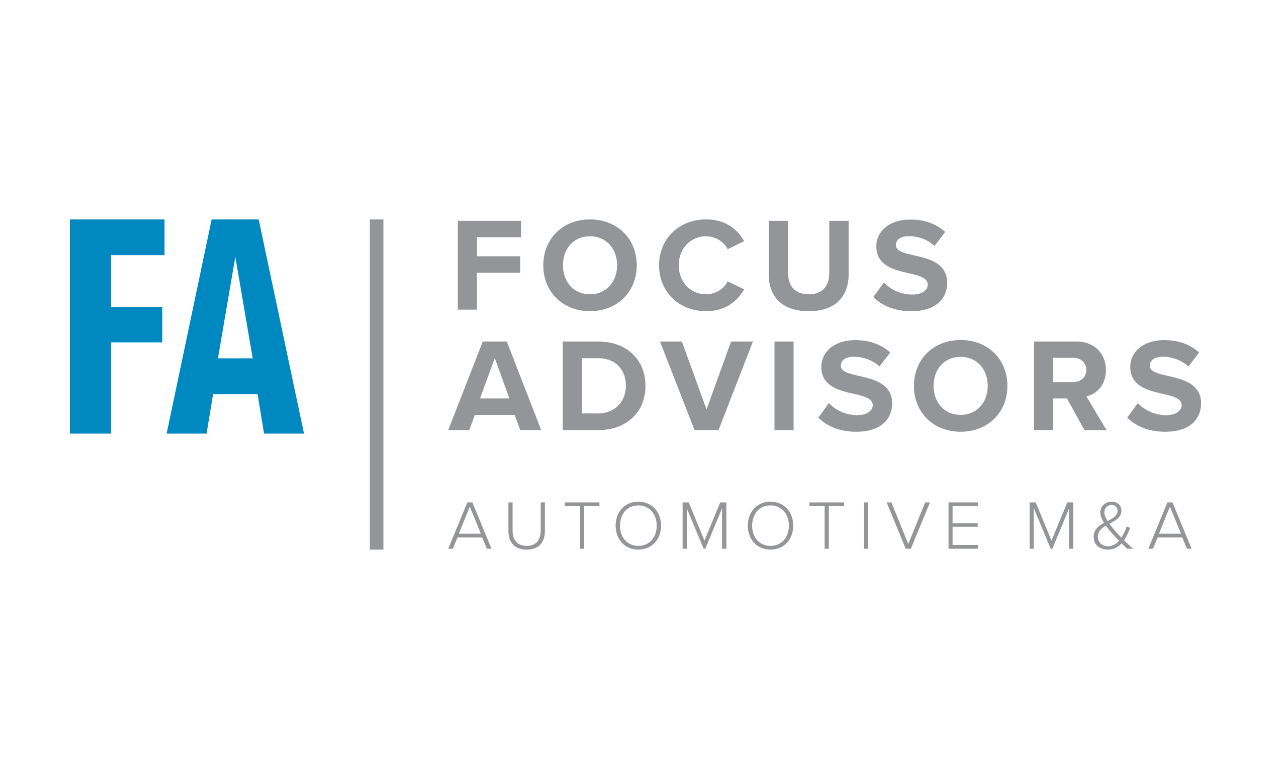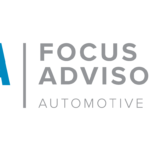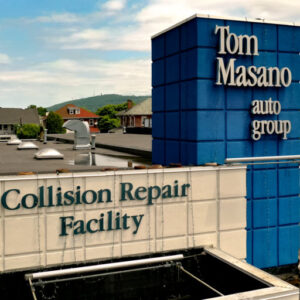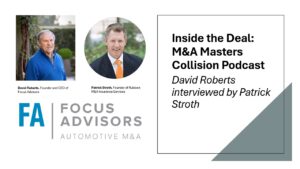Published in Autobody News April 27, 2020
Written by Stacey Phillips
David Roberts, managing director of FOCUS Advisors, Inc.
With Driven Brands‘ purchase of Fix Auto USA and Auto Center Auto Body on April 21, the collision repair industry is experiencing another shift in landscape during a time of accelerating consolidations.
FOCUS Advisors, a full-service mergers and acquisitions (M&A) firm specializing in the automotive aftermarket, announced the completion of the transaction for both parties in a press release to the industry.
Driven Brands, a portfolio company of Roark Capital, now operates more than 3,250 locations in seven separate firms, including collision repair franchisors CARSTAR, ABRA and MAACO.
Fix Auto USA, the U.S. licensee of the Fix Auto brand, has 159 locations and was founded by Erick and Shelly Bickett in 1997, with Fix Auto Quebec founder Jean Delise. In 2011, Fix Auto USA launched a franchise system and strategy led by Paul Gange, CEO of Fix Auto USA. Erick and Shelly also founded Auto Center Auto Body, a nine-location MSO in Southern California.
Autobody News had the opportunity to talk to David Roberts, managing director of FOCUS Advisors, Inc., about the transaction and its impact in the industry.
Q: Can you share some of the background of this transaction?
A: Erick Bickett and I have been friends and professional colleagues for nearly 27 years. He and Shelly Bickett have had a huge impact on this industry for a long time and are some of the most sophisticated operators in the country.
In the early 1990s, Erick was part of a group of seven body shop owners who created a brand called Caliber Collision. At the time, I had a partner named Matthew Ornstein. He and I were young entrepreneurs who had each done our own deals and felt that somebody was going to eventually consolidate the collision repair industry. We thought, “Why not us?” We approached the seven owners and presented a proposal. It took about a year and a half for them to accept it, but in 1995, we bought the Caliber Collision name and the right to lose a lot of money for a penny!
Together, for the next two years, we refined the offering, went out looking for money and raised the first private equity capital in the industry. I was chairman and head of acquisitions. Matt was CEO and ran finance and operations. He was a great partner who passed away far too soon.
Some time ago, Erick, Paul and I started talking about their investment in Fix USA and the way in which the company was gaining momentum. While Fix USA was delivering great value to its franchisees, many of them were looking for additional capital or ultimately an exit strategy. Erick and Paul saw an opportunity to provide financing solutions to those franchisees through external capital sources.
During this time, Fix USA continued to be regarded as a real class act in the industry. Since its inception, they invested in excellent systems, leadership and helping shops upgrade their operations. Insurance companies really trusted them.
The collision repair franchise landscape started to change when Driven Brands purchased CARSTAR in 2015. Roark Capital Group acquired Driven Brands the following year. Roark is one of the preeminent private equity firms that invests in franchisors, and they know that business well. Since they have owned Driven Brands, it has grown pretty dramatically and achieved the reputation as a very well-run company.
When Paul, Erick and Shelly began to evaluate outside capital options, they engaged us to represent them. We wrote a business plan and identified possible capital sources. After approaching a number of potential investors, Roark and Driven Brands showed the most interest and eventually decided they wanted to own the entire firm. But no transaction is ever done until the day it closes, and in this case, the day it closed was April 21.
Q: Please tell us about FOCUS Advisors and your involvement in the transaction.
A: FOCUS Advisors serves automotive aftermarket owners who are looking for advice and representation about their future possibilities. We advise our clients about growth and sale options and then represent them in mergers and acquisitions or capital formation transactions. Over the last five years, as managing director of FOCUS and a prior firm, we’ve completed more than 22 collision and paint distribution transactions.
In the collision repair industry, deals are increasingly represented by M&A firms. In the past, a lot of operators would receive a call from a consolidator who says they really love the owner’s business and want to buy it. The owner then throws out a number and by the time the deal gets done there might be lot of hiccups or changes and bad feelings. At the end of the day, the deal often doesn’t get done or it gets done at a price they don’t like. Sometimes it’s a great deal. Other times, it turns out to not be the most satisfying experience or the best outcome.
What we do is help our clients figure out what they really want and work with them to achieve that goal in a really organized and well-documented, well-articulated fashion. That’s the value we bring our clients.
In this case, having known Erick and Shelly and Paul for years and helping them strategize and put together their package, they were able to go to market with a coherent approach to potential buyers. I believe that’s one of the reasons they got the deal done even though we went from being in the best collision repair environment to maybe one of the worst.
It’s something we feel very proud of, but also at the end of the day, we are helping people who have invested a lifetime of effort building a wonderful business and now they get to realize some of their rewards.
Q: With so much uncertainty going on in the world and the collision repair industry due to the pandemic, how does a deal of this magnitude get accomplished?
A: We are all in the midst of this completely unforeseen, unprecedented time. However, we have demonstrated that a good transaction can actually get done. In fact, our belief is that things aren’t totally collapsing at least for a big segment of the economy and certainly for our industry. We are very pleased to have a successful transaction for our client.
Q: What is your long-term perspective in terms of how this transaction will impact the industry?
A: There are a lot of impacts going on simultaneously and now the pandemic has really thrown everything up into the air. There has been a long-term decline in the number of shops. At the same time, collision avoidance and technology systems are increasingly impacting the rate in which cars collide and the severity of those collisions as well. As a result, the cost of repairs is going up; the reality is there are going to be relatively fewer repairs per mile driven.
The confluence of these changes is altering the dynamic for every operator in the business. There are fewer operators who can truly be certified to repair the most sophisticated vehicles. As more cars are sold with these systems, the people who are going to be the most qualified to repair them are going to have to be better prepared. That means they are going to need advisors as well as expertise and training, and there are a number of ways they are going to get it. Inexorably, there are going to be fewer well-qualified providers, more certifications, more expensive repairs, and that means that more capital is going to be required, as well as more training and more sophisticated operators.
This is not the only way this industry is evolving but it highlights the opportunities available, and the challenges operators are going to have moving forward.
Q: What will the future hold for an independent shop owner?
A: Currently, there are thousands of single shops and small MSOs across the country. They operate in different communities in unique situations, and have built prominent businesses in their respective areas. Many of these business owners want to continue operating because they are very successful and love what they do.
At the same time, everybody recognizes the need to be better at what they do and one of the ways to do this is getting together with other successful business owners. It doesn’t necessarily mean you have to sell out. You can be part of a group and still stay independent. For example, franchise systems enable independent operators the opportunity to participate in an organization larger than themselves while still maintaining their independent ownership.
Q: In a changing landscape, how an independent shop owner can compete?
A: I have tremendous admiration for the people in this industry. They are some of the smartest, most creative and successful entrepreneurs that I know. But the landscape is constantly changing and getting tougher and tougher for small independents. The reality is that a two-shop operator who is competing against Caliber Collision, Gerber and Service King is going to have a tougher time unless they get more specialized, or closer to insurers, dealers or focus on particular brands.
Market dominant operators, especially in smaller markets, have natural advantages in continuing to upgrade their capabilities, market their brands and stay independent. The big guys have more attractive opportunities than trying to enter a small market against a high-quality, well-known independent.
The alternative is to join other folks and get bigger yourself. We have clients around the country who have literally gone from a two-shop $10 million operation to an eight-shop $40 million operation in the last four or five years. They are figuring out how to do it on their own through retained earnings, paint rebates and some borrowing. As a result, they are getting bigger and more sophisticated and are delivering better service. They are not the only ones finding unique ways to grow and stay relevant.
In addition to the three national consolidators, there are currently a handful of big regionals right now in the range of $100 million or more: Crash Champions Collision Repair in Chicago, ProCare Collision in Texas, Joe Hudson’s Collision Centers in the southeast, Classic Collision in Georgia and Florida and Collision Works in Oklahoma. We believe they are all going to get bigger and some will get competitive with one another and others will become competitive with the national consolidators.
They have a lot of fresh capital and they are going to be buying shops and probably opening some from the ground up. This provides additional exit opportunities for independent shop owners who decide they want to get out of the business or join with somebody bigger.
There are at least seven private equity firms looking for opportunities to invest in the industry. Some are looking at smaller operations, others are willing to lend to the industry, others want to build a national presence. This is just one piece of the landscape that provides alternatives for folks that are going to have to change with it.
Q: Do you have any concluding thoughts?
A: This pandemic is probably the most disruptive event for each of us in the last 50 years. For our parents and many of us, the Vietnam War and WWII had huge impacts. For our grandparents, it was the Depression. There was enormous pain and tragedy. But there was also enormous dedication, resilience and a common recognition that we are all in this together. This event is our challenge and opportunity.
As an industry, we will recover. But it will change how we do business in ways we cannot now foresee. So stay safe, keep your family safe, conserve cash, take care of your customers, your referral sources and your staff.
For more information about FOCUS Advisors, visit focusadvisors.com or email David Roberts at [email protected].
For more information about Driven Brands, visit drivenbrands.com.






